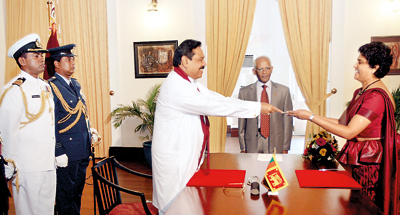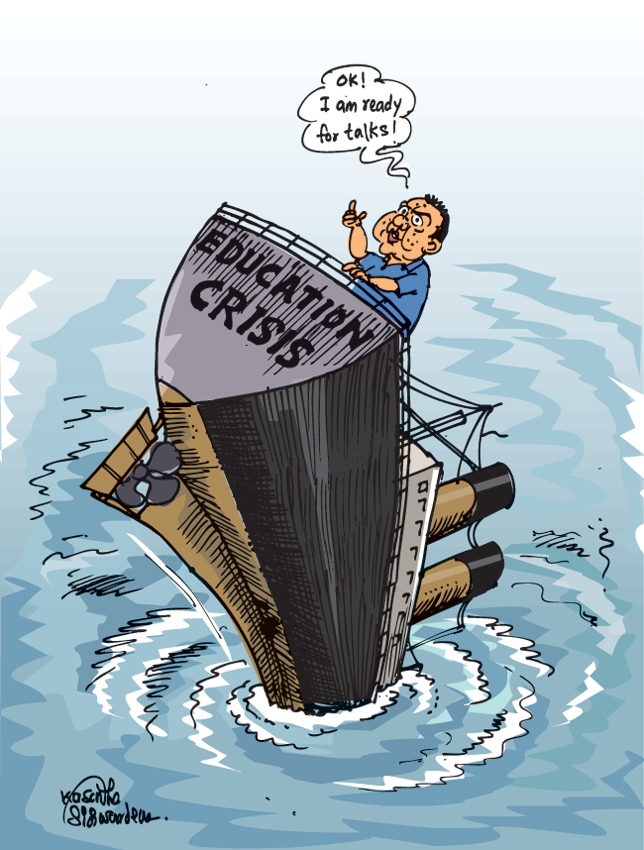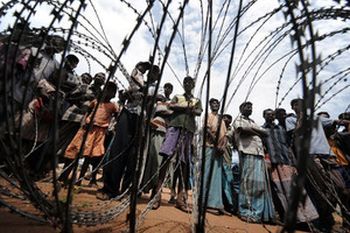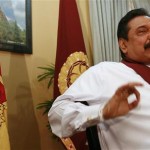Buddhist monks appropriate 100 acres of land in Akkaraippattu
 [TamilNet, Sunday, 30 September 2012, 22:05 GMT]
[TamilNet, Sunday, 30 September 2012, 22:05 GMT]
A group of one hundred Buddhist monks, backed by the Sri Lankan state in Colombo, visited Moddaik-kal-malai in Akkaraippattu division of Ampaa'rai district five days ago, declaring 100 acres of Tamils land surrounding the rock as a ‘sacred zone’ of Buddhists. Tamil civil officials in the area complain that Colombo and its Buddhist monks were planning to create a Sinhala colony in the lands that belong to Tamils.
The visiting Buddhist monks have claimed that the image of Lord Buddha is carved out in the rock in the area.
However Hindus in the area, disputing the claims by the Buddhist monks, say that the image is of Lord Vishnu and not of Lord Buddha.
The Saivite organisations in the three districts of Eastern Province have been complaining that the Sinhala Buddhist state in Colombo is waging an accelerated campaign of Sinhala Buddhist colonisation by destroying historic Hindu shrines in the East.
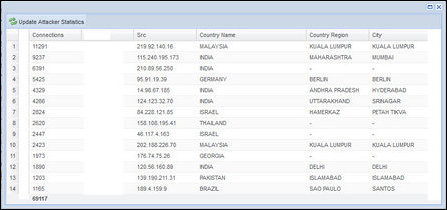 [TamilNet, Saturday, 29 September 2012, 22:47 GMT]
[TamilNet, Saturday, 29 September 2012, 22:47 GMT]
 Following persistent Distributed Denial-of-Service (DDoS) attacks on TamilNet in late February that coincided with the UN Human Rights Council sessions in Geneva, the site was once again intensively attacked this week by sources originating from various countries. Most of the co-ordinated attacks on 26 September originated from India, Malaysia, Israel and Germany. The attacks have also come from Thailand, Georgia, Brazil and Pakistan. This time, the cyber attacks on TamilNet coincided with its exclusive coverage exposing resettlement farce in Vanni, while Colombo and its abettors in the International Community of Establishments and in the international organisations, were projecting the closure of the IDP camp in Vavuniyaa as marking the successful completion of resettlement, ostensibly for the bailout of Colombo and continuation of the deceptive LLRC roadmap.
Following persistent Distributed Denial-of-Service (DDoS) attacks on TamilNet in late February that coincided with the UN Human Rights Council sessions in Geneva, the site was once again intensively attacked this week by sources originating from various countries. Most of the co-ordinated attacks on 26 September originated from India, Malaysia, Israel and Germany. The attacks have also come from Thailand, Georgia, Brazil and Pakistan. This time, the cyber attacks on TamilNet coincided with its exclusive coverage exposing resettlement farce in Vanni, while Colombo and its abettors in the International Community of Establishments and in the international organisations, were projecting the closure of the IDP camp in Vavuniyaa as marking the successful completion of resettlement, ostensibly for the bailout of Colombo and continuation of the deceptive LLRC roadmap.
“The attackers had IPs from many different countries, and multiple attack sources were from India. It is difficult, or perhaps sometimes impossible, to trace who hosted the attack, as the atttacks are normally commanded from a single source to many different hacked mach
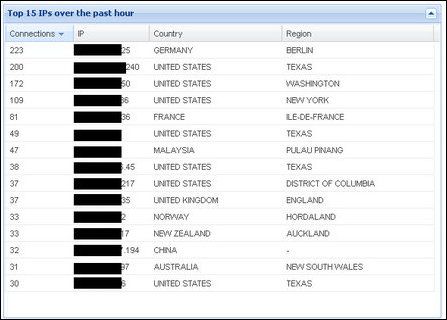 TamilNet was able to sustain the service without interruptions.
TamilNet was able to sustain the service without interruptions.
TamilNet is thankful for the support it has received from its readers in materially enabling it to meet the technological challenges dealing with DDoS and other types of cyber attacks.
Established in June 1995 as an electronic mailing list, TamilNet emerged into a newswire service with dedicated reporters, special correspondents and feature writers since it launched its web-based newswire service on 07 June 1997.
It now completes 15 years of service as an independent and not-for-profit newswire.
Sri Lanka is blocking the site inside the island since June 2007, but many savvy Sri Lanka users have since used free services available through proxies to access TamilNet.
TamilNet now plans to interact with its readers in the diaspora through direct meetings to strengthen its independent news coverage and necessary infrastructure arrangements.
 [TamilNet, Sunday, 30 September 2012, 22:05 GMT]
[TamilNet, Sunday, 30 September 2012, 22:05 GMT]A group of one hundred Buddhist monks, backed by the Sri Lankan state in Colombo, visited Moddaik-kal-malai in Akkaraippattu division of Ampaa'rai district five days ago, declaring 100 acres of Tamils land surrounding the rock as a ‘sacred zone’ of Buddhists. Tamil civil officials in the area complain that Colombo and its Buddhist monks were planning to create a Sinhala colony in the lands that belong to Tamils.
The visiting Buddhist monks have claimed that the image of Lord Buddha is carved out in the rock in the area.
However Hindus in the area, disputing the claims by the Buddhist monks, say that the image is of Lord Vishnu and not of Lord Buddha.
The Saivite organisations in the three districts of Eastern Province have been complaining that the Sinhala Buddhist state in Colombo is waging an accelerated campaign of Sinhala Buddhist colonisation by destroying historic Hindu shrines in the East.
DDoS attacks on TamilNet foiled
 [TamilNet, Saturday, 29 September 2012, 22:47 GMT]
[TamilNet, Saturday, 29 September 2012, 22:47 GMT] Following persistent Distributed Denial-of-Service (DDoS) attacks on TamilNet in late February that coincided with the UN Human Rights Council sessions in Geneva, the site was once again intensively attacked this week by sources originating from various countries. Most of the co-ordinated attacks on 26 September originated from India, Malaysia, Israel and Germany. The attacks have also come from Thailand, Georgia, Brazil and Pakistan. This time, the cyber attacks on TamilNet coincided with its exclusive coverage exposing resettlement farce in Vanni, while Colombo and its abettors in the International Community of Establishments and in the international organisations, were projecting the closure of the IDP camp in Vavuniyaa as marking the successful completion of resettlement, ostensibly for the bailout of Colombo and continuation of the deceptive LLRC roadmap.
Following persistent Distributed Denial-of-Service (DDoS) attacks on TamilNet in late February that coincided with the UN Human Rights Council sessions in Geneva, the site was once again intensively attacked this week by sources originating from various countries. Most of the co-ordinated attacks on 26 September originated from India, Malaysia, Israel and Germany. The attacks have also come from Thailand, Georgia, Brazil and Pakistan. This time, the cyber attacks on TamilNet coincided with its exclusive coverage exposing resettlement farce in Vanni, while Colombo and its abettors in the International Community of Establishments and in the international organisations, were projecting the closure of the IDP camp in Vavuniyaa as marking the successful completion of resettlement, ostensibly for the bailout of Colombo and continuation of the deceptive LLRC roadmap. “The attackers had IPs from many different countries, and multiple attack sources were from India. It is difficult, or perhaps sometimes impossible, to trace who hosted the attack, as the atttacks are normally commanded from a single source to many different hacked mach
 TamilNet was able to sustain the service without interruptions.
TamilNet was able to sustain the service without interruptions. TamilNet is thankful for the support it has received from its readers in materially enabling it to meet the technological challenges dealing with DDoS and other types of cyber attacks.
Established in June 1995 as an electronic mailing list, TamilNet emerged into a newswire service with dedicated reporters, special correspondents and feature writers since it launched its web-based newswire service on 07 June 1997.
It now completes 15 years of service as an independent and not-for-profit newswire.
Sri Lanka is blocking the site inside the island since June 2007, but many savvy Sri Lanka users have since used free services available through proxies to access TamilNet.
TamilNet now plans to interact with its readers in the diaspora through direct meetings to strengthen its independent news coverage and necessary infrastructure arrangements.
The above tables show the peak number of connections per hour from the top 15 most computers accessing TamilNet. From a single computer session, the average connections per hour is in the order of 200 to 400 connections. The attacking computers attempt to overwhelm the servers by trying to create tens of thousands of connections (per hour).
